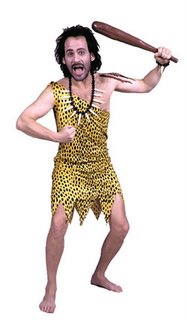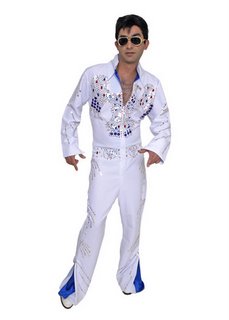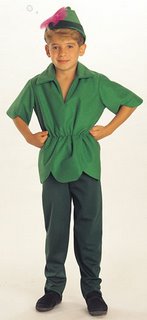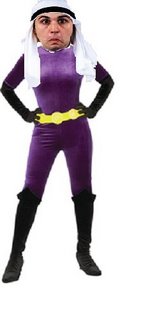Earl's Novel - Chapter IV (Part I)
(Editor's note: Earl Fando is currently writing a novel as part of the insane National Novel Writing Month Contest. As of this post, he has managed 16,000 words and is mumbling to himself in Welsh.)
Chapter 4
Haven’t I Seen You Somewhere Before?
As I drove the half an hour from the blog office to the Phoenix Corporation’s headquarters, I felt distinctly uneasy in the pit of my stomach. After I had tendered my resignation two years ago, I wanted to put Phoenix and everything that it does out of my mind. I was sworn to secrecy, of course, and signed all the relative forms. I was supposed to not tell another living soul what I had seen and done there, though I had, over the time I spent there, told my wife almost everything. I was happy not to be able to pass along the information, so strange and troubling it was. I was gratified not to walk up the long concrete pavement past the phalanxes of cameras, which I had danced for in more naive times. I was greatly relieved not to have to punch in and make my way past the massive layers of security. I was immensely thankful not to have to take the express, double-secure elevator up to the third floor wing where I worked as a personal assistant to my boss. Most of all, I was deliriously ecstatic to no longer have to work for the person to whose beck and call I was in thrall to for so long, my paranoid, manic boss.
You see, my boss was Richard Nixon.
Yes, that Richard Nixon.
The thirty-seventh president of the United States of America, the former Vice-President under Dwight D. Eisenhower, the man brought low by the Watergate scandal, the gridiron fanatic who sent hand-drawn plays to professional and college coaches, the man everyone called “Tricky Dick”, only not to his face or he’d throw something sharp at you. I worked directly for Richard Milhous “I am not a crook” Nixon.
I think the most shocking thing about the whole experience was the first day, when I walked in for the interview. It was shocking because Nixon was supposed have been dead for six years. I went in a special side entrance to the main building, because only fully authorized, security-cleared personnel or VIPs went through the front door. Nixon sat in on the interviews, wearing dark sunglasses, an LA Dodgers baseball cap, and a big, bushy fake moustache and beard. A Phoenix Corporation security guard, a bloke named Bob, gave the interview, reading from questions carefully prepared and handwritten by the ex-President. I found out later that Bob was chosen to handle the interview because it was his first week on the job and also because he walked on at linebacker for Ball State University.
I found out later that the only reason someone like me, with no government experience, a funny accent – as far as President Nixon was concerned, no military service record, and a career that had previously consisted of a variety of odd jobs in the grocery business, day care, computer training, and professional dancing …please don’t ask…anyway, that someone like me could get an interview at all at a place like Phoenix was that Nixon had decided that everyone with any governmental or military credentials could not be trusted. In other words, I was non-threatening enough to get the job. I was tremendously flattered, of course.
Nixon was very old by this time, and working for him was alternately entertaining and nightmarish. His legendary paranoia and narcissism had become more and more pronounced in a mind that was rapidly growing more feeble by the day. Frequently, before conversations of the most innocuous kind, he would have me check the halls and office bathroom, throw towels over the security cameras in the outside hallway, and turn on a portable radio to static and up the volume. This meant of course that not only could any eavesdroppers not hear what we were saying, but neither could we. This was compounded by the fact that, in his late eighties, Nixon had all the hearing of a Yorkshire pudding. Even at normal decibel levels, I frequently had to shout information to him. This was always followed by a stern rebuke and ruminations as to whether “Khrushchev was listening in.”
The one time I asked him about it, he said that his death had been faked so that he could get some rest and relaxation away from reporters and “***-damn Democrat pinkos still trying to get me convicted for something.” He also was fascinated with the idea of hearing all his eulogies, which he described as “very, very underwhelming…the pricks.”
He said he got the idea for the dramatic stroke from the Kevin Kline film Dave, released the year before.
“I could have won an Oscar for that performance, Merle! My housekeeper just about wet her pants when she saw me sprawled on the floor! She didn’t know it took me nearly 10 minutes just bend over and lay down!”
“Pardon me, did you say the film Dave, Mr. President?” was the only response I could come up with to that.
“The toughest part was being silent for three days. Merle, I almost lost it when Clinton came by for a secret visit to look in on me and spent half the time making out with a nurse.”
“Surely, he knew about the plan, Mr. President?” I asked.
“Nah! No one told him anything important. All that stuff went straight to Hilary,” he chortled. “He thought I was about to kick the bucket and wanted some last-minute pointers on secret White House rooms and exits. Merle, he actually tried to get me to write it down with my ‘good hand.’”
Yes, yes he almost always referred to me as Merle. I tried to correct him on the point several times, but I would only get something thrown at me in response. Fortunately, being a man in his late eighties, he threw like a man in his late eighties.
The only thing that kept him in a good mood was the occasional visit by a highly placed government official who needed advice. Nixon had planned to secretly retire to some remote isle in the Pacific, but he grew bored at the idea, and the government decided he had too much vital and classified information in his head to be allowed out of their grasp. So, he was given an “Emeritus” position at Phoenix. As his personal assistant, my job was essentially to manage his day at the office. The CIA arranged for his transportation home and someone there, presumably a former plumber or dishwasher, handled things.
As strange as it was to be working for the reputedly deceased, officially disgraced President of the United States, the Phoenix Corporation itself was a bastion of this kind of weirdness. It was, in fact, a secret wing of U.S. Intelligence designed to provide regular work for government officials and other personalities, both American and foreign, who had faked their deaths to escape the public eye.
I realised the sheer depth of this scheme on my first official day at Phoenix, when I did the company orientation. The personnel officer in charge of my orientation was none other than Jimi Hendrix. He took three stern looking intelligence types and me on a lengthy tour of the facility, at least to all the areas people at our security clearance level were allowed to.
We met the official “Greeter” for Phoenix, none other than legendary animator Walt Disney. Well, Walt Disney in part, I should say. It was actually only Walt’s head, suspended by some sort of magnetic levitation thingy, with large plastic tubes into his neck to provide oxygenated blood and nutrients to his brain. There was also a voice synthesizer that matched his original voice perfectly.
The feeding tubes were clear, so it looked quite gross. I found out later that this was one of the reasons he was the “Greeter.” The theory was that anyone clever enough to get past the complex security arrangements would run into this floating, blood-sipping severed, living head and in all likelihood make a quick decision to retreat. If they didn’t though, Walt was equipped with a high energy laser beam in his levitation thingy. Jimi had him display it during the orientation and he burned a hold right through the Coca-Cola machine in the lobby.
I decided then and there that I wouldn’t ask him to do the Mickey Mouse voice that he so famously originated. If I was to die at Phoenix, I hoped it would not be to the sounds of weak, male falsetto laughter.
I did ask him how he wound up in such a state. He sadly told me about the long illness, which was true, and then how the rumours that he had his head removed and cryogenically frozen were also true. However, the freezing process didn’t work out, but the government stepped in and had a better, more effective process involving… well, floating magnetic thingies. He wasn’t allowed to talk to me about the science of it all. The one beneficial side effect of the process though was that apparently it dramatically prolonged the life of human tissue, just as long as there wasn’t much more of it than about a human head.
The saddest part was when I asked him how he got his “Greeter” job.
“What else is a guy with no body going to do?” he said, shaking his head in a way that was both pathetic and highly disturbing.
Everyone at Phoenix who had faked their death had an interesting story. I asked Jimi after the orientation why he had chosen his especially gruesome death, asphyxiation by his own vomit.
“People don’t look too closely at that ****, man,” he responded, with a smile.
I could see his point.
Jimi later introduced me to his personnel manager, Janis Joplin, who had staged her own death to become an Amish farmer in Pennsylvania. She later had to give it up when a neighbor recognised her during a barn raising. Janis later told me all about the various personalities at Phoenix.
“…and Amelia Earhart was here back in the sixties before she died for real when she slipped on a banana peel in the cafeteria,” she revealed during a long conversation.
“So, let me get this straight,” I replied. “Elvis is on the security staff…”
“Right, because he was once deputized by your boss, the fascist, ****in’ warmonger,” she said with a laugh.
“…Jim Croce works in the cafeteria, Natalie Wood in the day care centre; Rajiv Gandhi is an accountant…”
“He’s an auditor, Earl. He doesn’t have his CPA,” Janis helpfully corrected.
“Right, sorry…River Phoenix is in the research department, Mobutu Sese Seko…”
“Mobutu Sese Seko Kuku Ngbendu wa za Banga,” she corrected again.
“…is in the janitorial department…”
“But no one likes him, because he walks around all day telling everyone how he’s the ‘Supreme Savior Combatant of the People’ or something like that,” added Janis.
“What about Marilyn Monroe?” I interjected.
“No, I’m afraid she really did die the way people heard it,” Janis said.
“Really?”
“Hey, if you don’t believe me, just go upstairs to the Cover-Ups department and ask Jack and Bobby Kennedy themselves.”












